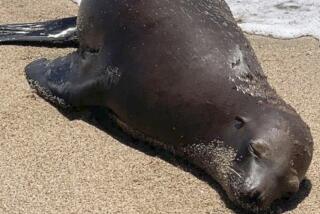Hazing keeps big pests at bay in Oregon
GOLD BEACH, ORE. — When Mark Lottis roars across the harbor in his 21-foot wooden longboat, fishermen and tourists cheer him -- but sea lions flee before him.
Lottis is the town’s first professional sea lion “hazer,” a job he took on after most of the salmon hooked last year were snagged off the line by sea lions.
The sea lion salmon thefts damaged the tourist and sport-fishing industry in this small coastal community at the mouth of the Rogue River. Some people said they’d never come back.
This year, things are different. In a season that lasted from July to early October, only 11 salmon were lost to sea lions, and observers give credit to Lottis.
A call will come over the CB radio on his boat -- “Mark, we’ve got one over here” -- and he immediately races across the bay, standing in the stern of the boat and firing up a propane torch. He reaches in his pocket for an underwater firecracker.
“It’s just like an M-80,” he says, tossing the firecracker into the water. “They’re designed for this. It’s a waterproof fuse.” Above the water you hear a pop, and after a few more firecrackers are launched, the sea lion typically will give up and head back toward shore to loll on the dock.
“They have learned that is a safe zone; I won’t chase them unless they come back out here,” Lottis says, indicating the outer estuary.
The hazing program is the brainchild of Lottis, 54, owner of a charter fishing service and president of the Curry County Sportfishing Assn. He has lived in Gold Beach for six years but has fished here for more than 20.
Underwater firecrackers have been used by commercial fishermen and others to repel pinnipeds for more than 30 years.
Under a 1992 amendment to the Marine Mammal Protection Act, a special permit is required to haze sea lions. The permit allows the use of underwater firecrackers and rubber bullets.
Griffin says no animal at Gold Beach has been harmed by the hazing: “The point is to make them modestly uncomfortable.”
Sharon Young, marine issues field director for the Humane Society of the United States, says her group supports the use of these nonlethal techniques, although she notes that there is always a risk to the animal.
Hazing permits can only be granted to government entities, in this case, the Port of Gold Beach, which contracts the service out to Lottis.
In 1972, sea lions had been hunted almost to extinction. Today the population is estimated to be 300,000. The massive mammals, which can weigh up to 800 pounds, don’t have a reputation as good neighbors.
Last year in Newport Beach, 18 sea lions climbed aboard a 37-foot sailboat and sank it. They occasionally have attacked swimmers and pulled people off boats. More typically, communities find it hard to cope with their barking and their waste.
A coalition of the states of Washington and Oregon and four Columbia River tribes are preparing an application for federal permission to use lethal means to control California sea lions on the Columbia River, at the Bonneville Dam. They say hazing efforts there have not been effective.
Last week, two Washington congressmen, Democrat Brian Baird and Republican Doc Hastings, announced a bill that would expedite that permission.
Charlie Corrarino, conservation and recovery program manager for the Oregon Department of Fish and Wildlife, believes that the success of the hazing at Gold Beach stems primarily from the size of the estuary -- a couple of miles long, a quarter-mile wide, and 14 to 15 feet deep.
“It isn’t the same in the Columbia -- it’s 140 miles long, 2 miles wide and 100 feet deep. They grab a salmon there, and they are off,” he says.
“The problem in the Columbia is a conservation problem,” says Griffin, the federal biologist. “The problem in Gold Beach was an economic problem -- and the solution was a community-based solution. Everyone on the river has been involved, on the radio, on the shore -- a part of the effort.”
More to Read
Sign up for The Wild
We’ll help you find the best places to hike, bike and run, as well as the perfect silent spots for meditation and yoga.
You may occasionally receive promotional content from the Los Angeles Times.






